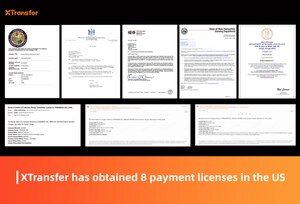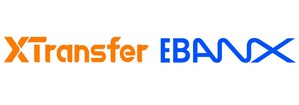XTransfer closes a $10 million series A round of financing led by China Merchants Group with participation from 01VC, Yunqi Partners and Gaorong Capital
XTransfer provides offshore financing solutions for China's SME through its global financial network. The company offers services such as global collection, payments, foreign exchange and wealth management.
SHANGHAI, Oct. 23, 2018 /PRNewswire/ -- XTransfer, a cross-border financial technology company dedicated to serving foreign trade B2B enterprises today announces it has secured a $10 million series A round of financing led by China Merchants Group with participation from 01VC, Yunqi Partners and Gaorong Capital. It is reported that the financing will be used for expansion by XTransfer of its international financial network, application for financial license and market promotion.
Founded in May 2017 and headquartered in Shanghai, XTransfer has offices in Hong Kong, U.K., Canada, Japan and the U.S. The company provides offshore financing solutions for China's small and medium importers and exporters through its global capital network, offering services such as global collection, payments, foreign exchange and wealth management.
China is currently the world's largest exporting nation, and the second largest importing nation. According to XTransfer founder Bill Deng, the Chinese government plans to additionally import USD 500 million to USD 1 billion of goods within the next five to ten years, the majority of which will be for local consumption to meet "people's desire for a happy life", a move which is in keeping with the businesses of small and medium enterprises. Thus, small and medium enterprises will in the future become a main force in cross-border import and export trade.
Nevertheless, enterprises in cross-border trades often face problems with respect to global collections, payment and foreign exchange. Large enterprises are capable of setting out dedicated teams to handle global funding by developing a complex system to link with banks. Small and medium enterprises in contrast, are beginning to find it difficult to open offshore bank accounts, not least because of anti-money laundering measures. Several banks in China with offshore account capabilities have begun to tighten their policies since the second half of 2014. For example, Hong Kong-based banks such as HSBC and Hang Seng Bank have since 2015 raised their bar for offshore account-opening, which has resulted in opening of accounts difficult for many people involved in foreign trade. Then in the second half of 2016, banks began to urge Chinese enterprises to close their offshore bank accounts. The Hong Kong Monetary Authority even explicitly stated in a special report on its website dated February 8, 2018 about the difficulty of opening offshore bank accounts in Hong Kong. An individual/entity who fails to open an account would have to wait for half a year or longer for a second attempt. This problem is compounded by the fact that large local and foreign banks refuse, out of consideration on return and risk, to serve small and medium enterprises which often yield low returns but present a high risk to the bank.
To tackle this problem, XTransfer partners with DBS Hong Kong and launches virtual sub-accounts with functions that are almost identical with those of traditional offshore bank accounts - it is akin to rendering the bank's counter work on-line. Enterprises in Mainland China and Hong Kong may open such an account by submitting their basic information to XTransfer's risk control team for verification. Furthermore, there are no charges for account-opening. Such offshore bank accounts are multi-currency accounts - they support up to 14 major currencies, with more currencies being added.
Unlike accounts in traditional banks, offshore accounts with XTransfer are free of maintenance fees, annual fees or even account-entry fee. They can also be opened quickly - many within 24 hours of submitting a completed application to open an offshore account with XTransfer.
XTransfer also faces money laundering risk. To counter this risk, Bill Deng reveals that it uses technology to verify the identity of persons having actual control over the enterprise, as well as identify the enterprise's structural data and logistics information.
Cross-border businesses often involve currency exchange. As 85% of China's foreign trades are with non-U.S. regions, such trades would require exchanging currencies on couple of occasions. For this XTransfer has launched a product called "XForward", allowing the buyer to give price quotation in his home currency. This has allowed emerging markets to be accessible. Buyers from non-US Dollar regions would not have to worry about exchange rate fluctuations as they only need to quote their prices in local currencies. This not only accelerates the negotiation process but also eliminates foreign exchange cost of buyers. XForward could also help buyers to lock in an exchange rate to avoid significant exchange rate fluctuations.
"First of all, we acquire users through providing free, rapid establishment of offshore accounts for foreign trade B2B enterprises. We are then able to offer a series of global wealth management activities and services including collection, payments and foreign currency exchange. Our aim is to enable small and medium foreign trade enterprises to enjoy, through standardized, electronic and data-enabled products, cross-border financial services that previously only large global enterprises would enjoy," said Bill Deng to iHeima.
It is understood that XTransfer is currently building an open platform for financial data related to international trade. Using end-to-end trade data, it aims to provide grass-root level financial infrastructure such as microfinance for financial institutions.
When asked about competitive barrier, Bill Deng took the view that in today's business environment, for someone to gain customers' trust, one must let customers feel that every aspect of a product has been meticulously crafted. It is just like entering a "bank's lobby" which is impeccably furnished to give customers increased confidence. As long as one continues to increase value-added services and supplies products according to customers' needs while also providing professional services, one will ultimately gain customers' trust. Customers will tell them how to expand customer base by meeting their needs before developing new products. All they need is to then use their technology and products to accomplish this objective. This is a virtuous cycle.
At present XTransfer serves more than 10,000 customers. Early in October the company also obtained a payment license in the U.K. on which it would conduct a round of promotion and advertisements at Canton Fair and in subways.
As for the future Bill Deng said that once XTransfer is able to penetrate the Chinese market, the same set of financial services solutions can also be used to serve small and medium enterprises in the Philippines, South Korea and Taiwan region which require offshore financial services.
In terms of the company's management team, all five of XTransfer's founders are from Ant Financial and Alibaba. They have seen within the Alibaba system the enormous success of One Touch which provides payment and financial services to small and medium foreign trade enterprises, despite the fact that it serves customers that make up less than 1% of the market. They also saw how innovative European fintech companies like TransferMate which focused on B2B cross-border financial services were expanding rapidly and attempting to open up the Chinese market. They therefore decided to leave Ant Financial to found XTransfer.
XTransfer CEO Bill Deng graduated from Fudan University before working for three years in the Beijing, Singapore and Shanghai offices of VISA. In 2010 he joined Alipay (he was in Alipay's International Operations Department in 2014, responsible for retail sales collections of Chinese vendors; in 2016 he was responsible for Alipay's cross-border remittance operations). He resigned from Alipay in April 2017 to become an entrepreneur.
The company's CRO Alice Yao graduated from Zhejiang University and has worked in American consulting firm Opera as well as PayPal under its Global Risk Management Department (covering payment risk, compliance and money laundering risk). In 2014 she joined Ant Financial, and was in charge of its Commercial Intelligence Department in 2016.
CMO Leon Deng was among the first batch of business development staff for PayPal. From 2011 to 2016 he served at Ant Financial's International Business Department where he was in charge of development of e-commerce exporters' retail collections and local e-commerce importers. In 2016 he worked in Aliyun where he was responsible for business development of solutions for the medical industry.
CPO/CSO K2 Deng joined Alibaba in 2004 and held a number of positions. He was regional manager for B2B China vendors. In 2014 he was at Alipay's International Business Department where he was responsible for external vendors. In 2016 he was responsible for Aliyun's international operations for corporate application. CTO Liu Yanfang worked in Alibaba's B2B operations where he was in charge of payment and financial technology; he set up Alibaba's payment and financial platform from scratch.
This article is originally written by IHeima. XTransfer is authorized to translate and reprint it in the release.
SOURCE XTransfer
WANT YOUR COMPANY'S NEWS FEATURED ON PRNEWSWIRE.COM?
Newsrooms &
Influencers
Digital Media
Outlets
Journalists
Opted In





Share this article